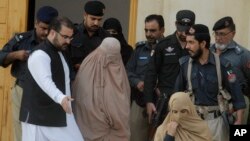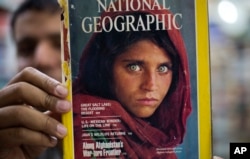A court in Pakistan has ordered authorities to deport the iconic green-eyed “Afghan Girl” who appeared on the cover of National Geographic magazine. The court has sentenced Sharbat Gulla to 15 days in prison for fraudulently obtaining Pakistani citizenship identity.
Authorities arrested the 46-year-old Afghan about two weeks ago at her residence in the city of Peshawar on charges of falsifying documents and illegally living in Pakistan with her family.
She appeared before a special anti-corruption and immigration court in Peshawar Friday and pleaded guilty, defense attorney Malik Mubashir Nazar told VOA. He also revealed Gulla is suffering from Hepatitis C and has been receiving treatment in a hospital in the northwestern city.
“Keeping in view her medical situation that she is suffering with Hepatitis C and she has minor siblings, three daughters and one son, the court took a very lenient view. The court have ordered 15 days imprisonment to her and the fine of 110,000 rupees ($1,100). The fine has been paid on the spot and now only she has to be in the judicial lockup only for four days more because 11 days have lapsed. After the completion of the sentence she will be deported,” said Nazar.
Gulla’s striking green eyes in her famous 1985 National Geographic cover photo, published when she was 12, became a symbol of the turmoil facing Afghanistan at the time that forced millions of Afghans to take refuge in neighboring Pakistan and Iran.
The Afghan woman’s detention outraged the Afghan nation, where she is still “a beloved and a national icon”, said Hazrat Omer Zakhilwal, the Afghan ambassador to Pakistan, while welcoming the court ruling.
“With utmost delight, I announce that Sharbat Gulla is now free from the legal troubles she endured over the past couple of weeks. She soon will also be free from an uncertain life of a refugee as she will be on her way back to her own country as soon as next Monday,” stated the envoy.
The photographer, Steve McCurry, who captured Gulla’s image in a camp for Afghan refugees in Peshawar, rediscovered her in 2002. He strongly objected to her arrest and condemned it as an “egregious" violation of her human rights.
Even Pakistani human rights defenders and media commentators slammed authorities for detaining the Afghan woman.
Amnesty International condemned the deportation decision as “a grave injustice.”
"For decades, she was known as the world’s most famous refugee and seen as a symbol of Pakistan’s status as a generous host. Now, by sending her back to a country she hasn’t seen in a generation and her children have never known, her plight has become emblematic of Pakistan’s cruel treatment of Afghan refugees," the London-based group said in a statement.
But attorney Nazar explained why the criticism, in his view, was misplaced. “Since she was found in possession of a Pakistani NIC (National Identity Card), so FIA (Federal Investigation Agency) obviously arrested her and charged her on that offense.”
Officials at the United Nations refugee agency, UNHCR, distanced themselves from Gula immediately after news of her arrest emerged, saying her name was not included on the list of around 1.5 million registered Afghan refugees in Pakistan.
There are an estimated one million Afghans living illegally in the country. But authorities have lately unleashed a crackdown on unregistered Afghans to force them to go back to their country.
U.N. officials say that the pressure, increase in monetary incentives for voluntary returnees and encouragement from the Afghan government have triggered an exodus of even registered refugees from Pakistan.
Under its voluntary repatriation program, the UNHCR says that more than 333,000 Afghans have returned from Pakistan within the past four months, including 148,000 in October alone.





